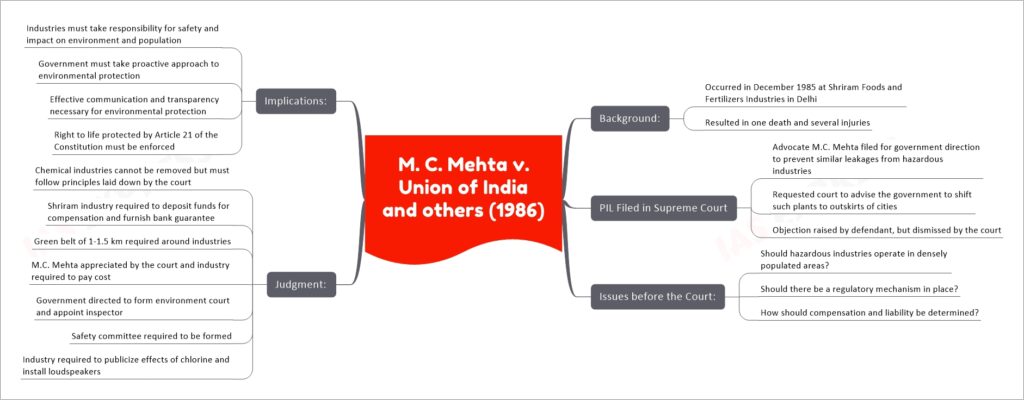M. C. Mehta v. Union of India and others (1986) – The landmark case that sparked environmental consciousness in India
The environmental health of the country has been affected by the rapid pace of development, urbanization and industrialization. India has faced several environmental disasters in the past due to the lack of proper environmental protection laws. The Environment Protection Act, 1986 was introduced after the Bhopal gas leak disaster. In this article, we will look at the landmark case of Oleum Gas Leakage, which was filed as a Public Interest Litigation (PIL) in the Supreme Court of India.

This topic of “M. C. Mehta v. Union of India and others (1986) – The landmark case that sparked environmental consciousness in India” is important from the perspective of the UPSC IAS Examination, which falls under General Studies Portion.
Background of the Case:
In December 1985, an oleum gas leakage occurred from a sulphuric acid plant at Shriram Foods and Fertilizers Industries, a subsidiary of Delhi Cloth Mills Ltd. The plant was located in a densely populated area of Delhi, causing one death and several injuries. The District Magistrate asked the management to close down the unit and explain the cause of the leakage.
Arguments:
Advocate M.C. Mehta filed a PIL petition in the Supreme Court, seeking the government’s direction to take necessary steps to prevent such leakages from the industries that engage in hazardous and dangerous manufacturing processes. The petitioner requested the court to advise the government to shift or relocate these types of plants to the outskirts of the city to avoid future incidents like the Bhopal gas case or the oleum gas leakage.
The defendant raised a single objection, claiming that the court should not take up this issue because the petitioner did not initially seek compensation. The court dismissed this objection, stating that the appeal for compensation was for the enforcement of Article 21 of the Constitution, which guarantees the right to life.
Issues before the Court:
The court was faced with several crucial issues:
- Should hazardous industries be allowed to operate in densely populated areas?
- Should there be a regulatory mechanism in place if these industries are allowed to operate in such areas?
- How should the amount of compensation and liability be determined?
Judgment:
The Supreme Court held that although these chemical industries are dangerous, they cannot be removed from the country as they contribute to the economic growth of the country and improve the quality of life.
The following principles were laid down by the court:
- Shriram industry was required to deposit Rs. 20 lakhs for compensations and furnish a bank guarantee of Rs. 15 lakhs for the next three years.
- The company was required to deposit Rs. 30,000 for the travel expenses of the expert committee members.
- A green belt of 1 to 1.5 km was required around these industries.
- M.C. Mehta was appreciated by the court and the industry was asked to pay Rs. 10,000 towards the cost.
The following conditions were imposed on the government:
- An environment court should be formed.
- The Central Pollution Control Board was directed to appoint an inspector.
- A safety committee was required to be formed.
- The industry was required to publicize the effects of chlorine.
- Loudspeakers were required to be installed to inform the surrounding people.
Implications of the case
This case has several important implications for the protection of the environment in India.
Firstly, it highlights the need for industries to take responsibility for the safety of their operations, and the impact they have on the surrounding environment and population.
- The court’s decision to make the Shriram industry deposit funds for compensation, as well as to make them furnish a bank guarantee, shows that industries must be prepared to face the consequences of any environmental damage that they cause.
Secondly, the case also highlights the role of the government in protecting the environment.
- The court’s decision to direct the government to form an environment court, as well as to appoint an inspector from the Central Pollution Control Board, shows the need for the government to take a proactive approach to environmental protection.
- Additionally, the decision to make the industry publicize the effects of chlorine, and to install loudspeakers to inform surrounding people of any potential dangers, also highlights the importance of effective communication and transparency in the protection of the environment.
- Environment Protection Act, 1986 introduced after Bhopal gas leak disaster.
Lastly, this case shows the importance of the right to life, as protected by Article 21 of the Constitution.
- The court’s decision to enforce this right, even in cases where the petitioner did not initially apply for compensation, highlights the need for individuals to have access to effective remedies for the protection of their fundamental rights.
Glossary
- Article 21: Protection of life and personal liberty
- Article 32: Remedies for enforcement of rights conferred by this Part
- PIL: Public Interest Litigation
- Environment Protection Act, 1986: statutory law in India that was enacted to protect the environment from the harmful effects of industrial and urban development.
This article is part of the series “Landmark Judgements that Shaped India” under the Indian Polity Notes & Prelims Sureshots. We aim to make the articles comprehensive while leaving out unnecessary information from the UPSC perspective. If you think this article is useful, please provide your feedback in the comments section below.


To the point and brief ….